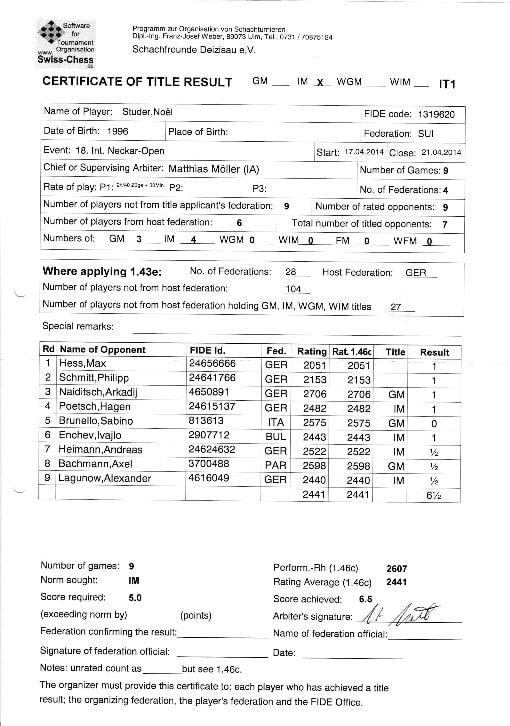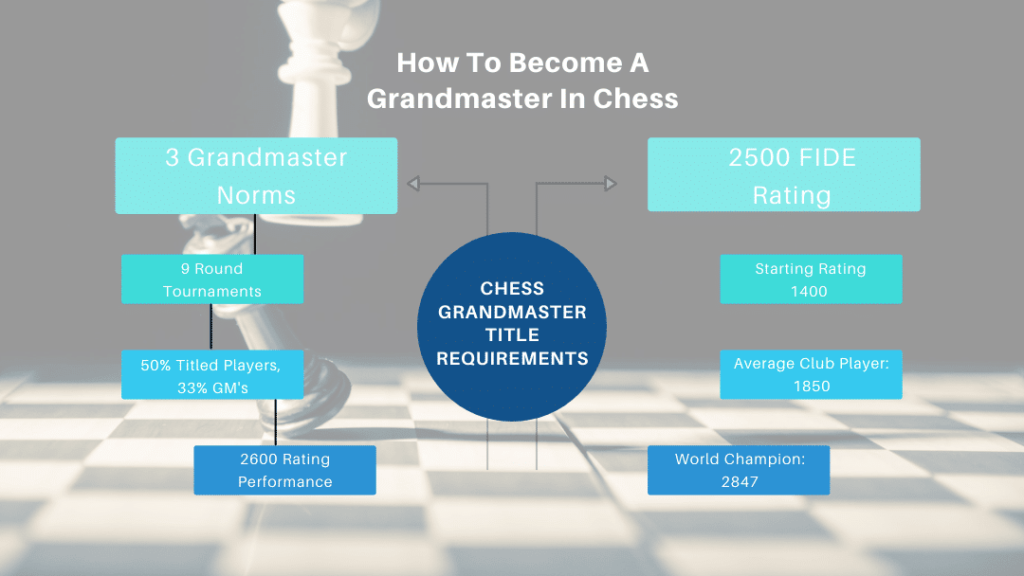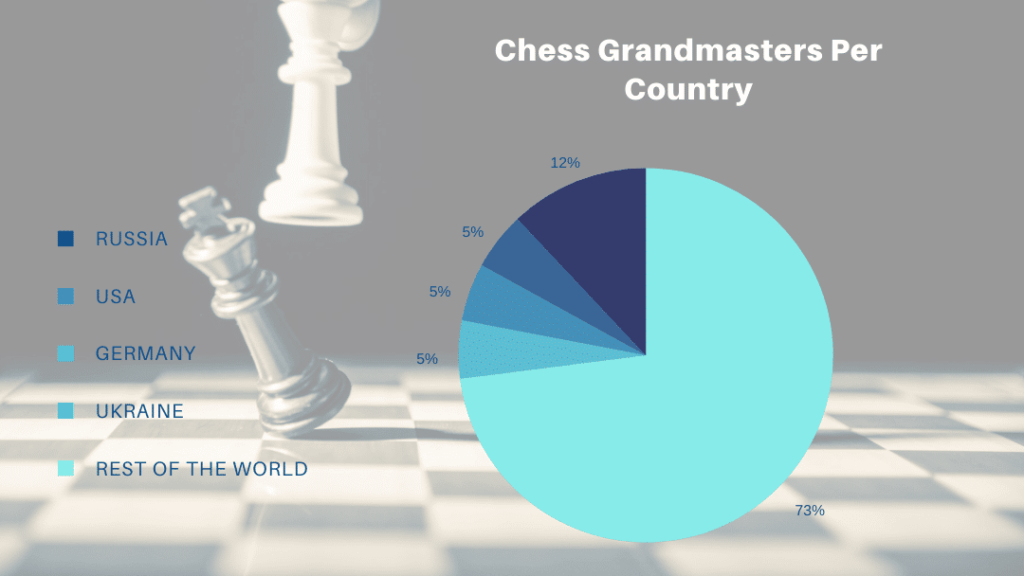Since I started playing Chess, it was my dream to become a Chess Grandmaster.
This title has wide recognition, even outside the Chess World. Nearly wherever you go, people will have heard of “Chess Grandmaster” as an elite and prestigious title. While most people know the Grandmaster title is prestigious, many do not know the specifics about it.
That is why in this article, I will focus on answering the following questions:
- What exactly is a Chess Grandmaster title and how does one get it?
- How many players have reached the Grandmaster title?
- Who is the youngest and the oldest ever Chess Grandmaster?
- And to finish it off I will give you some personal advice on your journey to the GM title
Current Regulations To Become A Chess Grandmaster
The Grandmaster (GM) title is the highest title that exists in Chess. It is given to a Player by the International Chess Federation (FIDE), the governing body of competitive Chess. Once achieved, the Grandmaster title is held for life.
The same goes for the less-known titles of International Master (IM), Fide Master (FM), and Candidate Master (CM). These titles are earned similarly but simply have easier criteria. Before becoming a Grandmaster, one usually gets the titles of Fide Master and International Master first.
While both Women and Men can become Grandmasters, there are also exclusive titles designated only for Women. Those are Women Grandmaster (WGM), Women International Master (WIM), Women Fide Master (WFM), and Woman Candidate Master (WCM).
The barriers to reaching those titles are lower since there are much fewer Women playing Chess competitively.
One needs to achieve two things to become a Grandmaster:
- FIDE Rating over 2500
- 3 Grandmaster Norms
While the first one needs consistency, the second one needs spectacular results in 3 different tournaments.
FIDE Rating
Once a Chess player becomes active, they will get a FIDE Rating. There are also national ratings, much like in Tennis, but for international titles such as the Grandmaster title, only the FIDE rating counts.
A normal starting rating is around 1400 FIDE. This entry rating depends on the performance in the first-rated tournament that a player participates in. From then on, each player wins or loses rating points with every tournament game they play.
At the beginning of a Chess career, one can win or lose up to 40 rating points per game. From 2400 FIDE onwards, one can win or lose only up to 9.2 rating points per game. This means the progress gets slower and harder, the higher up you go.
The amount of points one loses or wins depends on the respective rating of the opponent. The higher-rated the opponent, the more rating points one can win. The lower-rated the opponent, the more one can lose!
To get the first criteria for the Grandmaster title, a player needs to have a 2500 or higher FIDE rating at any point in their career! At the moment of writing, a 2500 FIDE rating would place you at number 800 on the World rankings.
To Recap:
- A normal starting rating is 1400 FIDE
- The average Club Player in Switzerland is around 1850 FIDE rated
- The number 100 in the World is rated 2650
- The World Champion is currently rated 2847
If you want to go deeper, you can find the FIDE rating list here.
I am currently Number 301 in the World with a rating of 2581.
Important disclaimer for all Online Chess addicts: 2500 FIDE does not equal 2500 on any online Chess-playing site. With millions of accounts online, these ratings are highly inflated!
Grandmaster Norms
In addition to the 2500 FIDE rating, one has to score 3 Grandmaster norms. There are some exceptions to this rule. As a matter of fact, there is a full chapter in the FIDE Handbook designated for international title regulations (including norms).
But in 90% of the cases, Grandmasters have scored 3 Norms.
Each Grandmaster Norm requires the following criteria:
- At least 9 rounds of tournaments
- 1/2 of the opponents must be titled players (FM, IM, GM, WGM, WIM)
- 1/3 of the opponents must be Grandmasters
- Rating Performance of 2600

So in total, a player needs to play at least 27 games (3×9) on the level of 2600 to achieve the Grandmaster title!
This is considerably higher than the FIDE rating of 2500 that one needs to achieve. This means a Grandmaster must show a big potential and over-perform their rating to get the prestigious title. You can calculate the rating performance with the help of the average opponent rating and your score.
An easy example is the following:
If you score 50% (4.5 points out of 9 games) against opponents with an average rating of 2600, you performed at 2600. As you equaled them in the score, your performance equals their average rating!
The lower your opponents are rated, the more points you need to score to achieve a 2600 rating performance. And vice versa.

How many Grandmasters are there in the World?
At the time of writing, there are 1939 Grandmasters in the World. I took this information from a Wikipedia article that seems very well-updated: there are 9 additions in 2021.
The first time FIDE awarded the Grandmaster title was in 1950.
The top 27 Players in the World got awarded this prestigious title. One of them is former World Champion Mikhail Botvinnik, one of my favorite Chess Players of all time. From then on, the rate of new Grandmasters increases steadily.
It took 17 years until 1967 for the 100th Chess Grandmaster to be crowned. In the first 50 years (until 1999), 774 players were able to reach the pinnacle of Chess titles. This means that from the year 2000-2021, a massive 1165 players got awarded the Grandmaster title. This is a rate of around 60 new Grandmasters every year!
Still, we are talking about a very tiny percentage of active Chess players. Estimations go from 500 Million to even 1 Billion Chess players all over the World. With the current online-Chess boom, these numbers are most probably on the rise.
Of those millions of chess enthusiasts, only a tiny percentage is really playing competitive Chess. At the time of writing, over 360’000 players are actively playing Chess! To be precise 367’398 members are to be found in the FIDE database.
This means that around 0,5% of the active Chess players get the Grandmaster title. And here we are only counting all the active Chess players in 2021. Taking into account all the players that played since 1950 and are not active anymore, it is fair to say that probably less than 0,1% of Chess players that ever played a FIDE event are reaching the Grandmaster title.
Female Grandmasters
Out of a total of 1939 Grandmasters, only 38 are female.
There are many theories as to why there are so few female Chess Grandmasters. This alone could fill a future article, so I don’t want to get into it now. Only two things I want to point out:
- There are much fewer female Chess players, so it is logical that there are less female GMs
- I am definitely not believing that it has to do something with Biology. People telling “females are just less smart” or some bullshit like that are living under a rock and not in the 21st century.
Black Chess Grandmasters
Only 4 black Chess players have ever reached the Grandmaster title.
The first was GM Maurice Ashley (USA). I can only recommend his interview on my favorite podcast, The Tim Ferriss Show. The other three are Pontus Carlsson (SWE), Amon Simutowe (ZAM), and Kenny Solomon (RSA).
It is sad that I have to mention it, but it has absolutely nothing to do with their race, but with opportunities. I am sure that with more opportunities, more African-born players will try and overcome the Challenge of being a Chess Grandmaster.
Where Are Most Grandmasters From?
Most active Grandmasters are living in Russia. A whopping 256 Grandmasters are registered under the Russian Flag. The United States of America has 101 active Grandmasters, while 96 Grandmasters are playing for Germany.
With the new possibilities via the Internet and great books available in all different languages, many countries have at least one Grandmaster to their name.
In the FIDE list of best countries, I counted an incredible amount of 88(!) different countries that have at least one Grandmaster. Even though Russia still has the most Chess Grandmasters. their percentage of overall GMs is getting smaller and smaller.

Who Is The Youngest Grandmaster In The World?
The record of the youngest Grandmaster in the World has just been broken by Abhimanyu Mishra (USA) at the tender age of 12 years, 4 months, and 25 days. Just read it again and think about it. A 12-year-old boy reached the highest title in the Chess World!
Even though I am a Grandmaster myself, this is way beyond my imagination.
When I was his age I just started out with a FIDE rating of 1918. It took me another 8 years to reach the Grandmaster title. If you want to know more about record-breaking youngsters, you can read this article.
As I said, it took me about 8 years longer to get the Grandmaster title. And the irony of it is that this is actually a national record!
I am the youngest ever Swiss Chess Grandmaster at 20 years and 6 months. This shows the huge gap in chess competitive cultures. If you are over 20 and would still like some more hope, there are other extremes as well.
Enrico Paoli was awarded the honorary Grandmaster title at age 88! Janis Klovans won the Senior World Championship aged 62 and thus got awarded the Grandmaster title. These are just two exceptional stories of gentlemen that have been able to reach the pinnacle of their careers very late in their lives.
Some Grandmaster Advice
In case you are feeling the motivation to work towards the highest title in Chess, I want to give you some advice. Here is what I would recommend to you in order to have a chance at the highest title in the World.
Be Consistent
It will be a long road until the Grandmaster title. Be prepared to face a lot of setbacks, roadblocks, and disappointments. If it was easy, then many more people would have reached it! That is why you need to be consistent with your training. Not for a week or two, but consistent for years. Maybe even for a decade or more.
The moment I touched my first Chess piece was around 2006. More than 10 years later, in 2017 I achieved the Grandmaster title. Over these years, I barely spent a week without Chess. I was not totally obsessed with it though. I still finished High-school and did some normal teenage things.
You don’t have to abandon everything else, but you should consistently strain your brain in order to improve your Chess. Nobody cares if you work 10 hours/day for 2 months. That does not last. Make sure to work 2 hours/day for 10 years. Then you will see real progress!
Focus On The Process, Not The Result
You might get tempted to think about all the steps in between and start to obsess about your rating. But that is the wrong way of going at it. On such a long journey, the process and the learning curve are so much more important than immediate results.
Tell yourself: If I ever reach the GM title, I will not care what if I won this game/tournament 3 years ago. I will only care what I learned that brought me to the GM title.
So instead of obsessing about short-term results, start to think about the process and your learning curve. Take decisions that might cost some rating in the short-term, but will give you invaluable learning experience later on. Only by taking the long-term approach, will you ever have a chance of reaching a goal so big as the Grandmaster title in Chess.
If you want to know more about this approach, I have written a very personal article on that topic.
Have Fun
Working hard for such a long time might take the fun out of things. Don’t let that happen. If you do not enjoy the process, reaching the goal will not make it worth it.
Make sure you really like playing chess.
You don’t have to like every training session. Nobody does.
But you should like the all-around experience.
I say it again: if you don’t like the process, even reaching the goal will NOT make it worth it.
Don’t Do It All By Yourself
If you go on this journey, then make sure to take some people with you. This can be in a form of Training Partners, Coaches, Psychologists, Friends, Family, or simply by reading books. It will be a long way and it is much more fun if you are not alone on your journey.
On bad days or after horrible blunders, you will love to have someone with you that can understand your emotions. There’s an old African proverb that says: if you want to go quickly, go alone. If you want to go far, go together.
Above all, life is more fun when you can share your success with somebody else. So make sure to take books as your mentors, have people you train with, get a Coach that can guide you, and take along friends and family members for emotional support.
The end goal isn’t reaching the Grandmaster title. It is living a worthwhile life. And if that includes the Grandmaster title, I wish you the best of luck!
If you want to kick it off and get on your way to becoming a GM, then I can wholeheartedly recommend the following article from fellow GM and friend Avetik Grigoryan. He ensures you have the right expectations when entering the GM title journey and answers some burning questions.